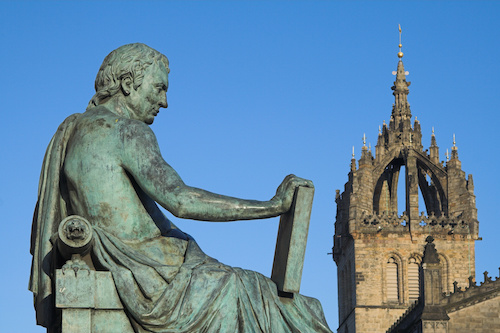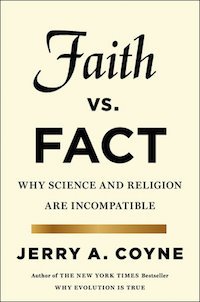 Evolution
Evolution
 Faith & Science
Faith & Science
Faith Versus Fact: In Search of Jerry Coyne’s Thesis

I just bought Jerry Coyne’s new book Faith Versus Fact: Why Science and Religion Are Incompatible. I’ve read a bit of it, and skimmed beyond that, and I think that some useful purpose could be served by commenting on it as I go (though there’s always the possibility of changing my perspective as Coyne develops his arguments).
The first things that strike me are:
-
Coyne writes well. He’s easy to read. Why Evolution Is True was comfortable prose as well.
-
His arguments are atheist boilerplate. None of the arguments I’ve come across are novel or even well thought-out elaborations on the New Atheist talking points.
-
Coyne’s thesis — science provides a better understanding of the world than religion does — is a conceptual morass.
Coyne sums up in the first chapter, titled “The Problem”:
Science and religion — unlike, say, business and religion — are competitors at discovering truths about nature. And science is the only field that has the ability to disprove the truth claims of religion, and has done so repeatedly (the creation stories of Genesis and other faiths, the Noachian flood, and the fictitious Exodus of the Jews from Egypt come to mind). Religion, on the other hand, has no ability to overturn the truths found by science…
 It’s not clear if Coyne actually believes that religion, like science, is about discovering truths about nature. Science and religion each provide implications for our understanding of nature and of God, but judging religion by its ability to reveal truths about nature seems to be a misunderstanding of religion’s scope. Religion is about transcendent eternal truths more than it is about natural science.
It’s not clear if Coyne actually believes that religion, like science, is about discovering truths about nature. Science and religion each provide implications for our understanding of nature and of God, but judging religion by its ability to reveal truths about nature seems to be a misunderstanding of religion’s scope. Religion is about transcendent eternal truths more than it is about natural science.
And I would disagree that “science is the only field that has the ability to disprove the truth claims of religion.” Truth claims are proven and disproven by logic, epistemology, and metaphysics, among many other disciplines. In fact, the concept of “proof” itself is something quite outside of natural science.
Coyne’s examples of “disproven” truth claims are dubious as well. The Genesis story of a moment of creation in a burst of light presaged the Big Bang theory by millennia, much to the chagrin of scientists who for centuries proffered the Steady State model. And Coyne’s claim that the Exodus is proven to be a myth is not an accurate representation of the view of historians. One wonders why Coyne, in his first statement of the problem he plans to address, would make such easily refuted misrepresentations.
But the fundamental problem with Coyne’s thesis is the problem of what it means to compare “science” and “religion” as paths to knowledge of the world. What does Coyne mean by science and religion? There are three potential meanings that I see:
-
Science and religion as cultural institutions.
Surely Coyne does not mean merely that the cultural institutions of science and religion differ in the production of knowledge about nature. It is true that MIT has contributed more to knowledge of the atomic nucleus than the Presbyterian Church has. But the Presbyterians have contributed better hymns. They have different jobs, and surely this is not Coyne’s point.
-
Science and religion as modes of inquiry.
It is in the nature of science to study nature. Religion isn’t really a field of study — an academic discipline — in the same sense. Religion is a praxis related to worship — a spiritual and cultural phenomenon, not an academic discipline.
It seems to me that the juxtaposition of science and theology is more apropos. Does science tell us more about the natural world than theology does? I would hope so. Science is the study of the natural world. Theology bears on science, in limited ways, as does science on theology, but one should not be surprised that science sheds more light on nature than theology does. Theology sheds more light on God than science does. Science and theology are not incompatible, as the history of science — replete with devoutly religious scientists and science that flourished in specific theological milieu — amply demonstrates.
-
Science and religion as placeholders for the relative effectiveness of atheist and theist worldviews.
This seems closest to the thesis Coyne is trying to develop. Coyne believes that atheist metaphysics provides a more reliable and effective platform for science than theistic metaphysics does.
This is his salient point, I think. It’s regrettable, however, that one has to do an exegesis of Coyne’s own thesis of his book.
Image: David Hume Monument and St. Giles Cathedral, Edinburgh, � Heartland Arts / Dollar Photo Club.
